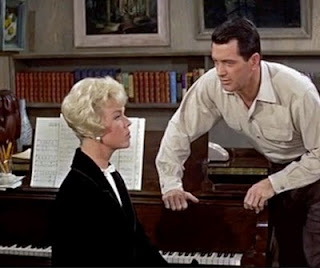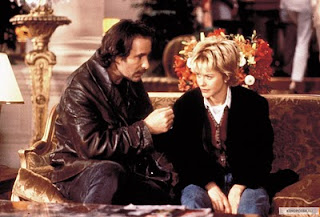 "THE DECONSTRUCTION OF DR. JACK SHEPHARD"
"THE DECONSTRUCTION OF DR. JACK SHEPHARD"I have a confession to make. I must have been among the few viewers of television’s
"LOST" who does not dislike the series’ lead character, Dr. Jack Shephard. Before anyone makes the assumption that he is a favorite character of mine, let me make one thing clear. He is not. But for some strange reason, I do not dislike Jack.
During the series' last three or four seasons, many fans have ranted consistently against Jack’s faults. Mind you, he is not the only flawed character in the series. In fact, most of the major charactes seemed to possess some very serious flaws. Jack Shephard seemed to be one of very few characters that has drawn a considerable amount of ire from the fans. I do not know why he has been specifically targeted by these fans. But I cannot help but wonder if the combination of Jack’s role as the series’ lead character and his flawed personality has set fans against him.
Now, someone might claim that my last remark sounds ridiculous. As I had earlier pointed out, most of the major characters are also seriously flawed or have committed some serious crimes. Extremely flawed characters like John Locke, Jin Kwon, Michael Dawson, Kate Austen, Miles Strume, Ana-Lucia Cortez, Charlie Pace, Sayid Jarrah, James “Sawyer” Ford, Sun Kwon, Boone Carlyle, Mr. Eko, Juliet Burke and Shannon Rutherford. Hell, the list is practically endless. And yet, the only other character who have received as much criticism or hate as Jack is Ana-Lucia Cortez. Why? Well, I have my theories.
Both Jack and Ana-Lucia had assumed leadership among the castaways at one time or the other, due to their personalities, circumstances and professions. Ana-Lucia had assumed leadership of the Tail Section passengers that crashed on one side of the island for forty-eight (48) days. Since Day One of the Oceanic Airlines Flight 815 crash, she stepped up and utilized her skills as a police officer to save lives and make decisions when no one else would. Jack, a spinal surgeon, did the same with the surviving passengers from the Fuselage Section on the other side of the island. In one early Season One episode,
(1.05) “White Rabbit”, he seemed willing to back away from the role of leader, until John Locke convinced him to resume it. Jack remained the leader even after Ana-Lucia and the remaining Tail Section passengers joined the Fuselage camp. And it was not until after his departure from the island in the Season Four finale with Hugo “Hurley” Reyes, Sun Kwon, Sayid Jurrah, Kate Austen and Aaron Littleton that he finally relinquished the position.
Recalling the above made me realize something. Human beings – for some reason or other – expect leaders to know everything and always do the right thing. Always. And without fail. Humans seemed to have little tolerance toward the imperfections of our leaders. This certainly seemed to be the case for fictional characters who are leaders. And many fans of "LOST" have harbored a deep lack of tolerance toward Jack and Ana-Lucia’s personal failings.
In the case of the former L.A.P.D. police officer, many fans have complained of her aggressive personality. They have also accused her of being a bitch. In other words that means being aggressive and hard – traits many have claimed are more suited for a man, instead of a woman - is a sure sign that a woman is a bitch. And unlike other female characters on the series, Ana-Lucia lacked the svelte, feminine looks prevalent in the
"LORD OF THE RINGS" saga.
Actually, gender politics also seemed to have played a great deal in the fans’ opinion of Jack. His main crime seemed to be that he does not fit the image of a heroic leading male character. Physically, he looks the part. Unfortunately for Jack, he failed to live up to those looks. He has made the wrong choices on several occasions – choices that included his decision to continue with the plan to set off the nuclear bomb Jughead in the Season Five finale,
(5.16/5.17) “The Incident”. It is interesting that many fans have dumped most the blame upon Jack’s shoulders regarding that bomb. And he is partially to blame. But these same fans failed to remember that the plan to detonate the bomb belonged to Daniel Faraday. He was the first who had insisted upon setting off the bomb to reset time back to the day of Flight 815’s crash – September 22, 2004. Many have accused Jack of failing to be a proper parent figure to his nephew, Aaron Littleton, during his three years off the island. And at the same time, many have praised Kate Austen for pretending to be the boy’s mother. I found this rather perverse, considering that Kate had set in motion the lie about her being Aaron’s mother. Jack was guilty of supporting Kate’s lie. But instead of criticizing both for lying about Aaron and keeping him from his Australian family, these fans have criticized Jack for not being an effective father figure Aaron and praised a kidnapper like Kate for being a good mother. Ah, the ironies of life.
Many fans have accused Jack of being emotionally abusive toward Kate during the series' first four seasons. And yes, they would have every reason to criticize his behavior. But Kate had allowed herself to be victimized by Jack’s anger and insecurities. Worse, her own behavior – namely her constant lies and attempts to manipulate him and others – occasionally triggered his temper. If one character is going to be criticized for the situations I have previously described, so should the other character involved in those situations. Some of Jack’s other mistakes included sanctioning Sayid’s torture of Sawyer, failure to organize a search for the kidnapped Walt Lloyd, instigating that ludicrous search for Michael Dawson and communicating with Martin Keamy and the other hired mercenaries aboard the S.S. Kahana. Yet, he has received more complaints about his relationship with Kate and his tendency to get emotional and shed tears than for anything else. Once again, many fans managed to prove that we still live in a patriarchal society. It was okay for female characters to shed tears in very emotional moments, but not male characters. Especially if one male character happens to be the series’ leading character.
Jack’s penchant for tears was not the only sign of how some fans can be hypocritical. I have written articles criticizing some of the series’ other characters. Most of my articles have criticized Kate Austen. I will be honest. I used to dislike Kate very much. But most of my previous dislike had stemmed from her past flaky behavior and especially the fans’ tendency to excuse her mistakes and crimes . . . or pretend that she had never done anything wrong. However, Kate was not the only character given this leeway. James Ford had murdered three people – one in Australia and two on the island. Yet, many fans tend to make excuses for him. I do not dislike James. But I have complained about his flaws, mistakes and crimes. When I do, many fans tend to pretend that he has not done anything wrong. And I find this frustrating.
Sometime back in Season Two or Season Three, actor Matthew Fox and the show’s producers, Carlton Cuse and Damon Lindelof, made it known to the media and viewers that they were doing something different with the Jack Shephard character. They took a superficially heroic type – a brilliant surgeon that assumed leadership of a group of stranded castaways – and deconstructed him. In other words, they slowly but surely exposed his flaws and took the character to what could be viewed as the nadir of his existence. Whether Jack will be able to climb out of that existence remains to be seen. From what fans on the many "LOST" message boards and forums have expressed . . . this is not a path they wanted Jack to take. Instead, these fans wanted – or demanded that Jack behave like a conventional hero.
During most of Season Six, Jack managed to avoid indulging in self-destructive behavior. He also refrained from displaying any inclination to pursue a romance with Kate. The worst he has done was engage in a temper tantrum over his discovery in
(6.05) "The Lighthouse" that the island’s spiritual
“man” Jacob has been observing and possibly interfering in the lives of several castaways. Another personality change I noticed was that he had passively allowed others to take the lead without questioning their decisions. I must be honest. I never liked that particular period in Jack's emotional makeup It made him seem like a mindless moron.
Did Jack finally become the hero that so many demanded, when he saved the island before his death? Personally, I never did care less about his status as a hero. Nor did I really care for his passive behavior in Season Six. But I did hope that he would finally discover some inner peace for himself. And I believe that he did in his final moments, as he laid in the jungle, and watched Kate and the other survivors leave the island for good.


















































